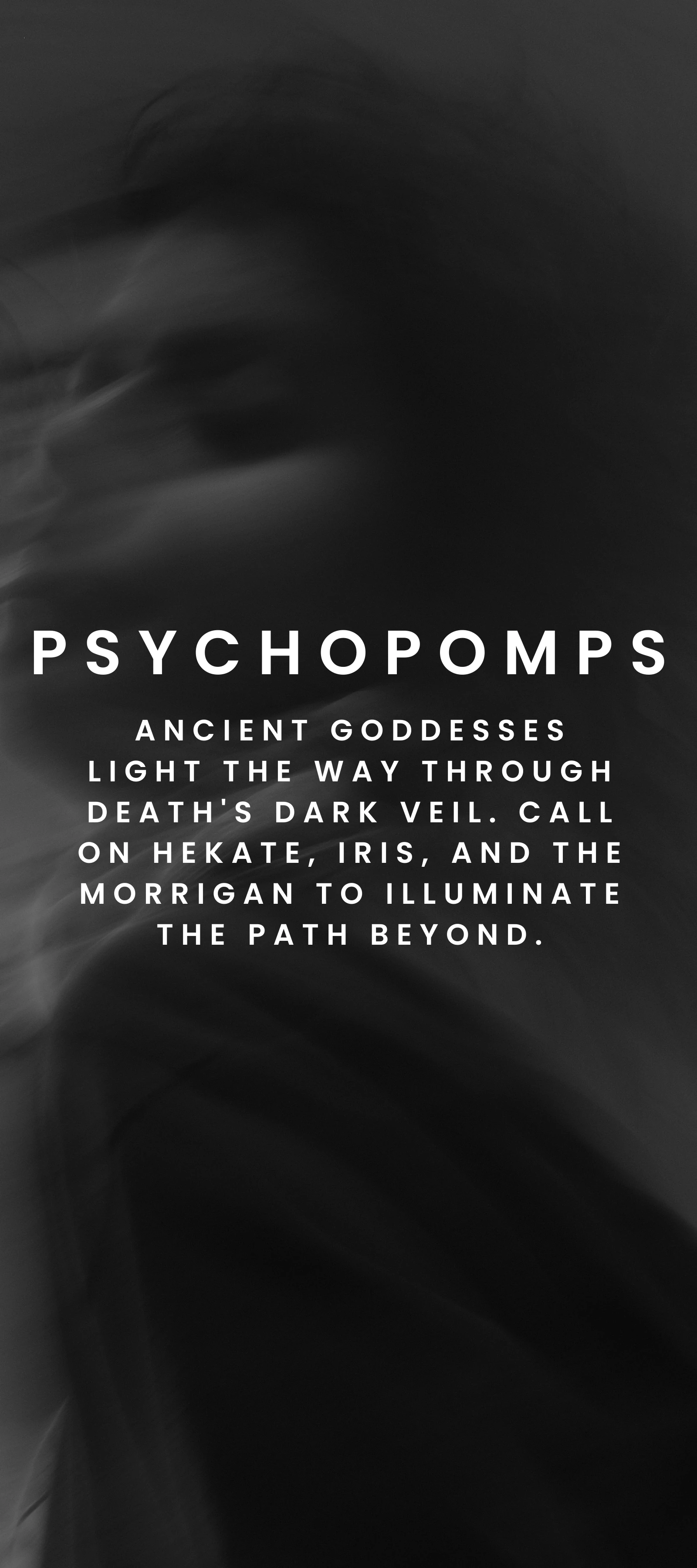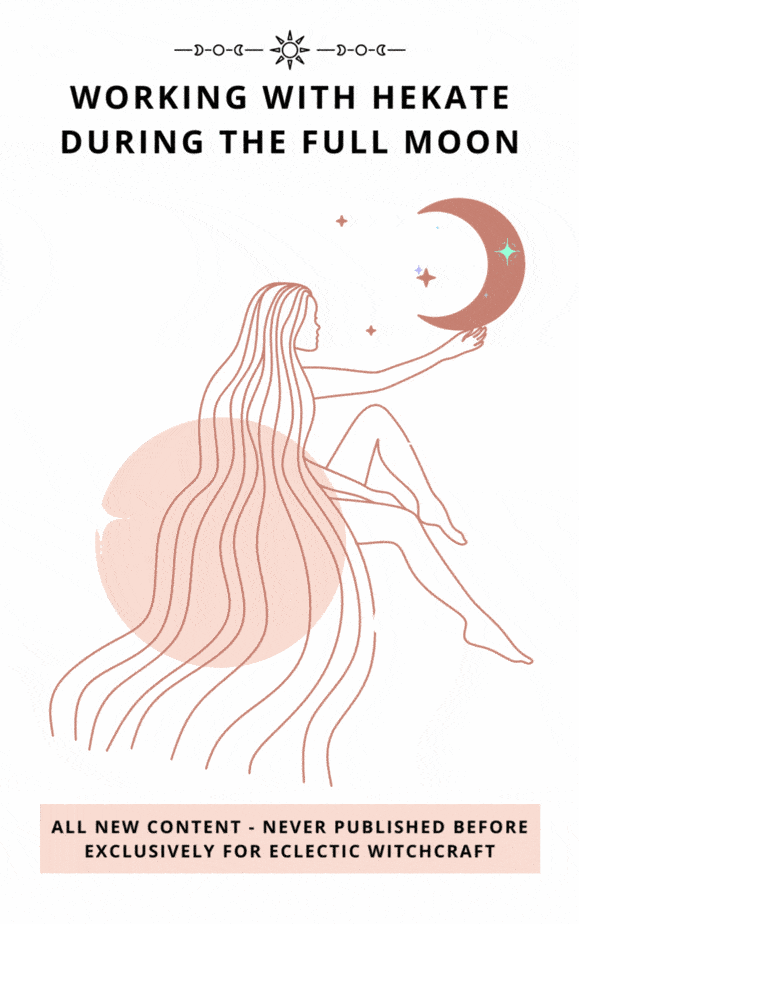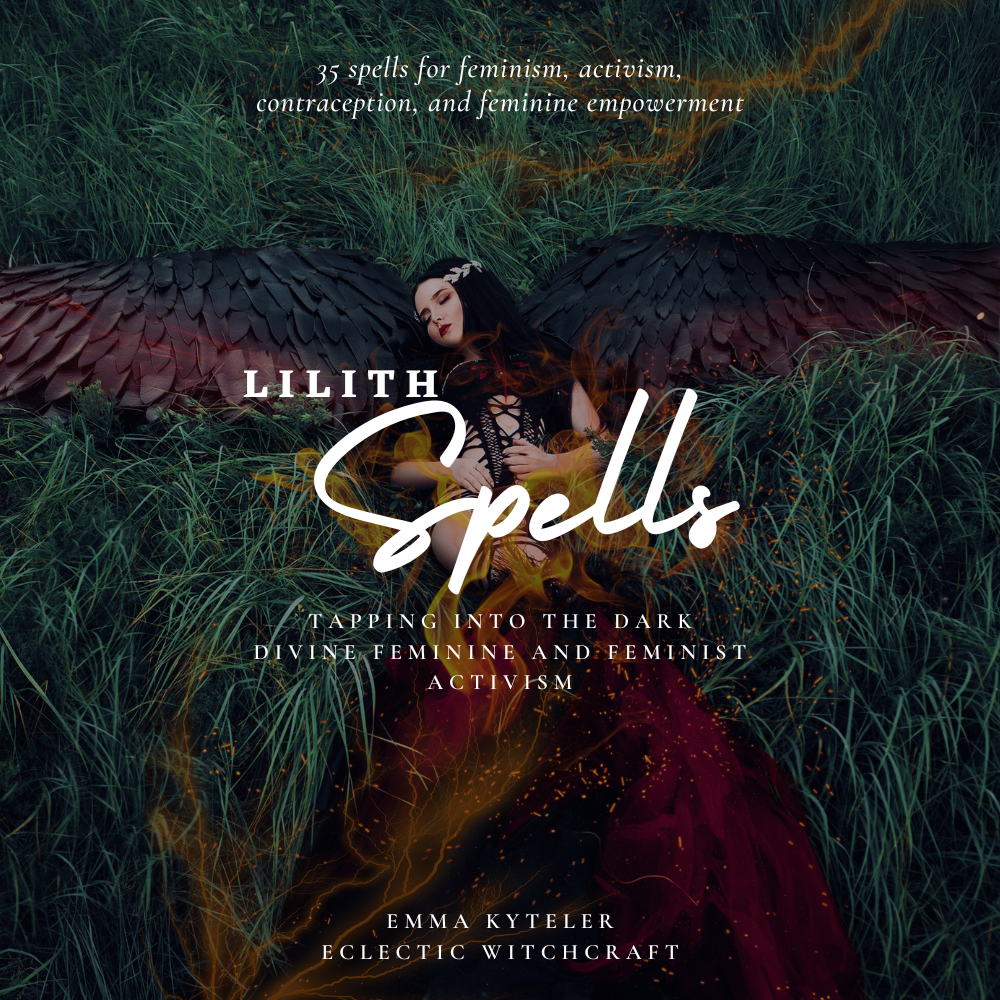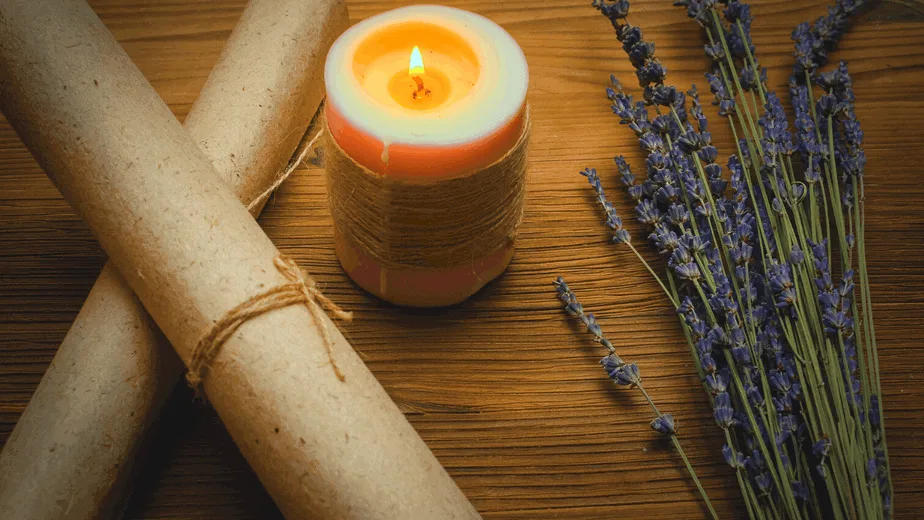Please note that posts on this site may contain affiliate links
Psychopomps and spirit guides are present in many religions around the world. Their purpose is to escort newly deceased souls from the realm of the living to the afterlife. These otherworldly ferrymen ensure a safe spiritual journey to the great beyond. Across cultures, psychopomps are depicted as deities, angels, demons, or ancestral spirits who shepherd spirits across dangerous terrain and supernatural obstacles.
By learning about these underworld escorts, we can better understand humanity’s intimate relationship with death and the great mysteries that lie beyond.
- Hekate: Goddess of Witchcraft and the Crossroads
- Hermes: Guide of Souls and Messenger of the Gods
- Iris: Goddess of the Rainbow
- Anubis: Jackal God of the Afterlife
- Osiris: Supreme God and Judge of the Dead
- Azrael: The Angel of Death in Islam
- Valkyries: Choosing and Escorting Warrior Souls
- Charon: Ferryman of the River Styx
- Yama: Hindu God of Death and Justice
- Baron Samedi: Loa of the Dead in Vodou
- The Morrigan: Celtic Phantasm of Death and Fate
- Quetzalcoatl: Feathered Serpent Guide of Souls
Hekate: Goddess of Witchcraft and the Crossroads
In Greek mythology, Hekate is a powerful goddess associated with magic, witchcraft, ghosts, and necromancy.
As the guardian of the crossroads, she was believed to guide souls to the underworld upon death. Hekate was the only deity aside from Hermes who was able to move freely between the realms of the living, dead, and divine.
She illuminates the liminal spaces between worlds with her twin torches, serving as a spirit guide to lost souls and new initiates alike.
Hekate rules over:
- Crossroads
- Night
- Moon
- Magic
- Necromancy
- Ghosts
- Divination
- Initiation
She is often depicted as three-formed, representing her dominion over the heavens, earth, and underworld. Her sacred animals are dogs, especially black hounds.
Hekate’s magical herbs and plants include aconite, mandrake, cypress, garlic, lavender, and poppy. She is associated with the dark of the moon and her feast days are celebrated on the full moons of May, August, and November.
Hekate serves as a spirit guide for witches and mystics seeking to commune with spirits of the dead or see beyond the veil. By honoring her, they gain protection and safe passage to the world beyond the mundane.
During the full moon, we call upon Hekate to assist us in clearing our past, releasing our fears, and opening ourselves to new possibilities. We ask her to help us gain clarity in our lives, to help us transform our inner worlds, and to allow us to move forward with courage and confidence.
It is said that Hekate helps us to overcome obstacles and challenges that stand in our way, and to achieve our goals. In addition to being a benevolent Goddess, she is also a fierce warrior. When we summon her, we invite her to help us take charge of our lives, to lead us into battle, and to fight for justice.
I am an eclectic witch - I've been practicing since 1974. As a student of the occult, working with astrology, tarot cards, runes, and numerology, I found that this was a very comprehensive and well written text on working with Hekate during the full moon. Highly recommended. - Gail Sager
Great read - a must have for anyone interested in working with the Goddess during the full moon! Highly recommended! - Luis Meyer
Hermes: Guide of Souls and Messenger of the Gods
In Greek mythology, Hermes is the clever and quick-witted messenger of the gods and guide of souls to the underworld. As a psychopomp, his role is to safely escort newly deceased souls across dangerous terrain and supernatural obstacles to reach the afterlife.
Hermes eases the transition between life and death with empathy, compassion, and care.
Hermes rules over:
- Messages
- Communication
- Travelers
- Boundaries
- Thieves
- Commerce
He is recognizable by his winged sandals and hat. He carries a caduceus staff entwined with two snakes, symbolizing his role as mediator between polarities. The sacred plants and herbs of Hermes include cinnamon, mint, thyme, marjoram, and parsley.
His feast days were celebrated with offerings and rituals on the fourth day of every month. As a psychopomp, Hermes guides souls to their precisely deserved afterlife, whether the Elysian Fields or Tartarus.
With his divine winged sandals, he traverses between realms with great speed, allowing no soul to be left wandering the earth as a restless ghost.
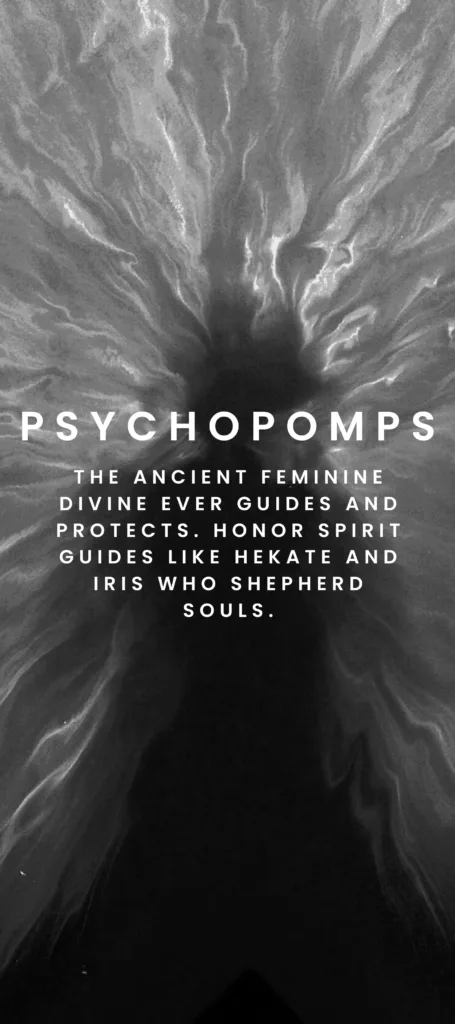
Iris: Goddess of the Rainbow
In Greek mythology, Iris is the winged goddess of the rainbow and a messenger of the gods. As a psychopomp, she serves as a bridge between the realms, transporting souls on multi-hued rainbows arching from heaven to earth.
With her iridescent wings, Iris descends to collect souls and carry them beyond the mortal realm. She is a servant of Hera and linked with feminine divinities across cultures as a spirit guide.
Iris rules over:
- Rainbows
- Messages
- Transitions
- Omens
- Dreams
She represents the shifting colors and liminal nature of the rainbow. Iris connects shifting phases and realms safely for souls journeying between worlds. Her symbols include the rainbow, of course, as well as the fleur-de-lis scepter. Irises and violets are her sacred blooms.
With compassion and care, Iris guides souls to their new destination, providing a vibrant ray of hope.
Anubis: Jackal God of the Afterlife
In ancient Egyptian mythology, Anubis is the jackal-headed god associated with mummification and safe passage to the afterlife. As a psychopomp, Anubis escorts souls from death to the Hall of Truth, where their hearts are weighed against the feather of Ma’at.
He provides protection and guidance through the perilous journey beyond the mortal realm.
Anubis rules over:
- Embalming
- Burial rites
- Tombs
- Just judgement
- Loss
He is recognizable by his black jackal head atop a human body, often dressed in white linen wrappings. As patron of lost souls, Anubis provides comfort and redemption to the deceased as they transition to the Field of Reeds.
His sacred animals are black canines, including jackals, hounds, and wolves. Offerings to honor him include incense, oils, and votive offerings placed in tombs to protect the dead. With Anubis as guide, souls can feel safe to shed their mortal coil and move through death’s dark veil without fear.
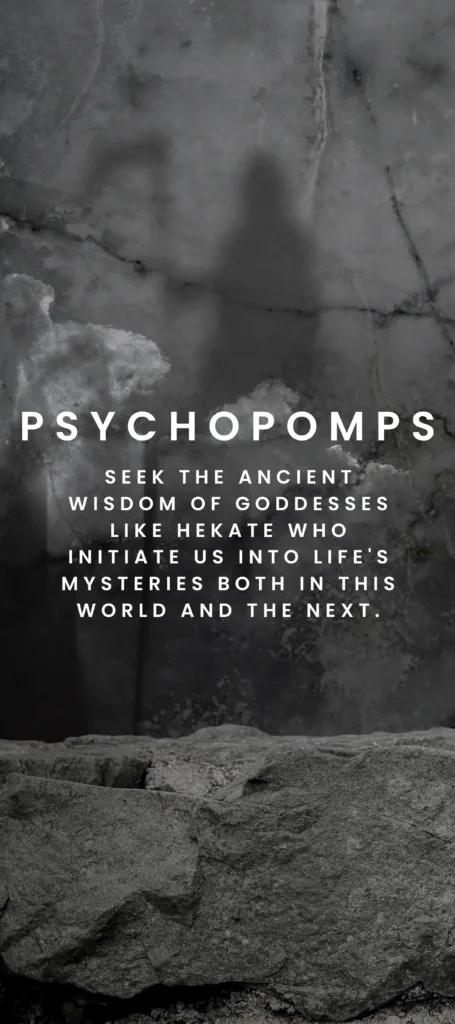
Osiris: Supreme God and Judge of the Dead
In Egyptian mythology, Osiris is the ruler of the dead and the afterlife. As judge of deceased souls, he is a psychopomp guiding the worthy to paradise in the Duat, or underworld.
Souls are brought to the Hall of Truth where their hearts are weighed against the feather of Ma’at to determine if they led a virtuous life on earth. Osiris then decrees the just fate of the soul.
Osiris rules over:
- Death
- Resurrection
- Fertility
- Rebirth
- Justice
Recognizable by his green skin and white mummy wrappings, Osiris wears the atef crown and holds crook and flail. His death and resurrection reflect the Egyptian belief in eternal life. Sacred plants of Osiris include barley, grapevines, ivy, and papyrus.
His feast coincided with the flooding of the Nile and sowing of crops. As ruler of the underworld, Osiris admits worthy souls to Aaru, or paradise, while the unrighteous were devoured by Ammit. He reminds us we reap what we sow in life, and death provides the ultimate reckoning.
Azrael: The Angel of Death in Islam
In Islamic and Jewish traditions, Azrael is the Angel of Death who helps souls transition from the earthly realm to the afterlife.
Sent by God, Azrael gently separates the soul from the body at death. He is believed to be both compassionate and comforting to those passing away.
Azrael rules over:
- Gentle death
- Crossing over
- Grief
- Bereavement
- Transition
Azrael provides great solace to the dying and grieving. He offers mercy, soothing souls being separated from loved ones. Azrael appears differently to each person according to their expectations. His style ranges from a hooded figure to a being of divine light.
Azrael reassures souls they will find peace as he guides them to the threshold of the spiritual realm. Prayers invoking Azrael provide comfort to the bereaved through his divine protection and wisdom.
Valkyries: Choosing and Escorting Warrior Souls
In Norse mythology, Valkyries are female figures who serve Odin, the chief god. As psychopomps, they are responsible for choosing warriors who die bravely in battle and escorting their souls to Valhalla in the afterlife.
The Valkyries decide who is worthy to enter Odin’s great hall and join him in the preparations for Ragnarok, or the final destiny of the gods.
Valkyries rule over:
- War
- Fate
- Glory in death
- Choosing the slain
- Escorting brave souls
The Valkyries select only the most valorous heroes to join Odin’s army in Valhalla and comfort the dying on the battlefield. They wear armor and carry shields as they ride flying horses across the sky. Sacred plants of the Valkyries include yew, sage, and rosemary.
Funerary rites invoked the Valkyries to guide the brave dead to the glorious afterlife they earned. The Valkyries remind us to live and die with courage and honor.
Charon: Ferryman of the River Styx
In Greek mythology, Charon is the ferryman who carries souls across the river Styx to the underworld. This river forms the boundary between the mortal realm and the land of the dead.
Charon conveys departed souls across these perilous waters to the gates of Hades. He requires payment of a coin placed under the deceased’s tongue to grant them safe passage.
Charon rules over:
- Rivers
- Borders
- Guidance
- Conveyance
- Rituals
Charon is often depicted as a ragged, unkempt old man piloting a wooden skiff. Sacred plants offering protection on Charon’s journey include cypress, yew, garlic, and hellebore. Proper burial rites and offerings ensured save passage with Charon.
He reminds us that while death is inevitable, ancient traditions ease the transition to whatever lies beyond the veil for all souls.
Yama: Hindu God of Death and Justice
In Hinduism, Yama is the Dharmaraja – god of death, justice, and time. As a psychopomp, Yama escorts souls to the afterlife and judges them based on their virtues and vices while on earth. He is both stern in his punishment of evildoers and compassionate in his treatment of the righteous.
Souls must present themselves before his throne for a full accounting of their earthly deeds.
Yama rules over:
- Death
- Karma
- Rebirth
- Natural law
- Justice
He is often depicted wearing red robes and having a green complexion. Yama carries a loop of rope to lasso wayward souls and compel them to face their karmic destiny. Basil, hibiscus, and rosemary are his sacred plants. Yama reminds devotees to live an ethical, generous, and mindful life – lest they face the wrath of the god of death upon passing to the other side.
Baron Samedi: Loa of the Dead in Vodou
In Haitian Vodou, Baron Samedi is a loa (spirit) associated with death and the afterlife. Dressed as an undertaker in black tailcoat and top hat, he is often depicted with a skull-like face or wearing skull make-up.
As guardian of the cemetery, Baron Samedi greets the souls of the newly dead and helps them adjust to the afterlife. With his raucous, clownish humor, he lightens the fear around death.
Baron Samedi rules over:
- Death
- Sexuality
- Obscenity
- Life’s pleasures
- Graveyards
His profane, lewd, and inappropriate behavior counters his deathly image. Baron Samedi’s sacred plants and herbs include tobacco, chili peppers, and rum. Worshippers offer these items to gain his favor and assistance transitioning their loved ones’ souls safely to the realm of spirit.
Baron Samedi reminds us not to take death too seriously and find reasons for joy and laughter, even in our darkest moments.
Delve into the mystical world of "Lilith Spells: Tapping Into The Dark Divine Feminine And Feminist Activism," a powerful grimoire that will guide you on a transformative journey through the realms of Lilith, the first wife of Adam, feminist icon, and demon goddess. Unearth the secrets of this enigmatic figure, who embodies the essence of feminine power, independence, and rebellion against patriarchal oppression. Includes 35 unique spells.
The Morrigan: Celtic Phantasm of Death and Fate
In Celtic mythology, the Morrigan is a mysterious goddess strongly associated with battle, fate, and death. She appears in shifting forms, most often as a sinister raven flying above scenes of carnage.
As a psychopomp, the Morrigan is believed to gather and guide the souls of warriors who fall in combat. She also determines the fate of soldiers in battle.
The Morrigan rules over:
- Battle
- Fate
- Prophecy
- Shape-shifting
- Sovereignty
This dark goddess has a strong link with the dead and dying. The Morrigan’s plants include yew, willow, sage, and rosemary. She is linked to the bean sidhe, or banshee, who wails as an omen of imminent death.
The fearful sight of the Morrigan signals dark times ahead. She compels us to prepare bravely to face the unknown and our certain mortality.
Quetzalcoatl: Feathered Serpent Guide of Souls
In Aztec mythology, Quetzalcoatl is the god of wind, wisdom, and cyclical renewal. With his feathered serpent iconography, Quetzalcoatl represents the bridge between earthly and divine.
As a psychopomp, Quetzalcoatl guides souls on their journey through the nine underworlds to reach their resting place in the afterlife. He provides protection and courage for souls navigating this harrowing road.
Quetzalcoatl rules over:
- Death
- Resurrection
- Regeneration
- Liminality
- Dawn
Quetzalcoatl carries a sacred conch shell he blows to announce the sun’s daily rebirth. His temple rituals included human sacrifice to nourish and revitalize the life cycle. Sacred plants of Quetzalcoatl include maize, cocoa, and peyote.
He reminds us of the cyclical nature between life, death, and rebirth. Like him, we can shed the past and regenerate.
These diverse psychopomps from mythologies around the world reflect humanity’s multifaceted relationship with mortality. The examples here represent just a fraction of the rich traditions honoring guides who ease our transition from this world to the next.
By learning their attributes and rituals, we discover how cultures found solace and meaning through the great mystery of death. The psychopomp reminds us we do not take this journey alone.
Spirit guides escort souls with wisdom, empathy and care – illuminating the way forward through life’s most unfathomable transition.
